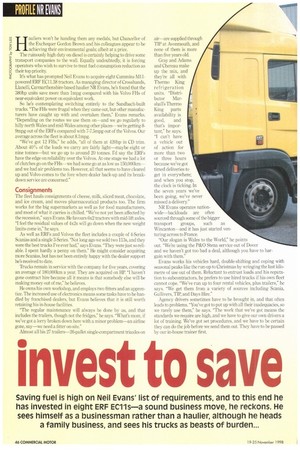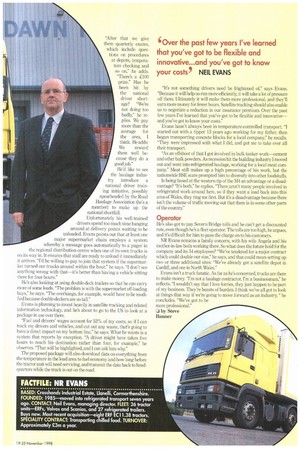invest to save
Page 48

Page 49

If you've noticed an error in this article please click here to report it so we can fix it.
Saving fuel is high on Neil Evans' list of requirements, and to this end he has invested in eight ERF ECils—a sound business move, he reckons. He sees himself as a businessman rather than a haulier, although he heads a family business, and sees his trucks as beasts of burden...
PHOTOGRAPHY by TOM LEE
Hauliers won't be handing them any medals, but Chancellor of the Exchequer Gordon Brown and his colleagues appear to be achieving their environmental goals; albeit at a price. The ruinously high duty on diesel is certainly helping to drive some transport companies to the wall. Equally undoubtedly it is forcing operators who wish to survive to treat fuel consumption reduction as their top priority
It's what has prompted Neil Evans to acquire eight Cummins M11powered ERE EC11.38 tractors. As managing director of Crosshands, Llanelli, Carmarthenshire-based haulier NR Evans, he's found that the 380hp units save more than 1mpg compared with his Volvo PHs of near-equivalent power on equivalent work.
So he's contemplating switching entirely to the Sandbach-built trucks. "The FHs were frugal when they came out, but other manufacturers have caught up with and overtaken them," Evans remarks. "Depending on the routes we use them on—and we go regularly to hilly north Wales and mid-Wales among other places—we're getting 89mpg out of the ERFs compared with 7-7.5mpg out of the Volvos. Our average across the fleet is about 8.1mpg.
"We've got 12 EHs." he adds, "all of them at 420hp in CD trim. About 40?,) of the loads we carry are fairly light—maybe eight or nine tonnes—but we go up to around 20 tonnes. I'd say the ERFs have the edge on reliability over the Volvos. At one stage we had a lot of clutches go on the Flis—we had some go at as low as 150,000kmand we had air problems too. However, all that seems to have cleared up and Volvo comes to the fore where dealer back-up and its breakdown service are concerned."
Consignments
The fleet hauls consignments of cheese, milk, sliced meat, chocolate, and ice cream, and moves pharmaceutical products too. The firm works for the big supermarkets as well as for food manufacturers, and most of what it carries is chilled. "We've not yet been affected by the recession," says Evans. He favours 6x2 tractors with mid-lift axles. "I feel the residual values of 4x2s will go down when the new weight limits come in," he says.
As well as ERFs and Volvos the fleet includes a couple of 4-Series Scanias and a single 3-Series. "Not long ago we sold two 113s, and they were the best trucks I've ever had," says Evans. "They were just so reliable. I spent hardly a penny on them." He might consider acquiring more Scanias, but has not been entirely happy with the dealer support he's received to date.
Trucks remain in service with the company for five years, covering an average of 180,000km a year. They are acquired on HR "I haven't gone contract hire because all it means is that somebody else will be making money out of me," he believes.
He owns his own workshop, and employs two fitters and an apprentice. The increased use of electronics means some tasks have to be handled by franchised dealers, but Evans believes that it is still worth retaining his in-house facilities.
"The regular maintenance will always be done by us, and that includes the trailers, though not the fridges," he says. "What's more, if we've got a lorry broken clown here with a minor problem—an airline gone, say—we need a fitter on-site."
Almost all his 27 trailers-26-pallet single-compartment triaxles on air—are supplied through TIP at Avonmouth, and none of them is more than five years old.
Gray and Adams and Chereau make up the mix, and they're all with Thermo King refrigeration units. "Distri
butor Marshall's Thermo King parts availability is
good, and that's important," he says. "I can't have a vehicle out of action for more than two or three hours because we've got timed deliveries to get in everywhere; and when you stop, the clock is ticking. In the seven years we've been going, we've never missed a delivery" NR Evans operates nationwide—backloads are often sourced through some of the bigger transport groups, such as
Wincanton and it has just started venturing across to France.
"Our slogan is Wales to the World," he points out. "We're using the MO Stena service out of Dover and we haven't got too bad a deal, although you have to bargain with them."
Evans works his vehicles hard, double-shifting and coping with seasonal peaks like the run-up to Christmas by wringing the last kilometre of use out of them. Reluctant to entrust loads and his reputation to subcontractors, he prefers to use hired trucks if his own fleet cannot cope. "We've run up to four rental vehicles, plus trailers," he says. "We get them from a variety of sources including Scania, Gullivers, TIP, and Days Hire."
Agency drivers sometimes have to be brought in, and that often leads to problems. "You've got to put up with all their inadequacies, so we rarely use them," he says. "The work that we've got means the standards we require are high, and we have to give our own drivers a lot of training. We've got set procedures, and we have to be certain they can do the job before we send them out. They have to be passed by our in-house trainer first. "After that we give them quarterly exams, which include questions on procedures at depots, temperature checking and so on," he adds. "There's a £100 prize." Has he been hit by the national driver shortage? "We're not doing too badly," he replies. We pay more than the average for the area, I think. He adds: We reward them well because they do a good job."
He'd like to see the haulage industry introduce a national driver training initiative, possibly spearheaded by the Road Haulage Association (he's a member) to make up the national shortfall.
Unfortunately his well-trained drivers spend too much lime hanging around at delivery points waiting to be unloaded. Evans points out that at least one major supermarket chain employs a system whereby a message goes automatically to a pager in the regional distribution centre when one of its own trucks is on its way in. It ensures that staff are ready to unload it immediately it arrives. "I'd be willing to pay to join that system if the supermarket turned our trucks around within the hour," he says. "I don't see anything wrong with that—it's better than having a vehicle sitting there for four hours."
He's also looking at using double-deck trailers so that he can carry more of some loads. "The problem is with the supermarket off-loading bays," he says. "The overhangs, for example, would have to be modified because double-deckers are so tall."
Evans is planning to invest heavily in satellite tracking and related information technology, and he's about to go to the US to look at a package in use over there.
"Fuel and drivers' wages account for 52% of my costs, so if I can track my drivers and vehicles, and cut out any waste, that's going to have a direct impact on my bottom line," he says. What he wants is a system that reports by exception. "A driver might have taken five hours to reach his destination rather than four, for example," he observes. "That will be highlighted, and I can ask him why."
The proposed package will also download data on everything from the temperature in the load area to fuel economy and how long before the tractor unit will need servicing, and transmit the data back to headquarters while the truck is out on the road. "It's not something drivers need be frightened of," says Evans. "Because it will help us run more efficiently, it will take a lot of pressure off them. Ultimately it will make them more professional, and they'll earn more money for fewer hours. Satellite tracking should also enable us to negotiate a reduction in our insurance premium. Over the past few years I've learned that you've got to be flexible and innovative— and you've got to know your costs."
Evans hasn't always been in temperature-controlled transport. "I started out with a tipper 13 years ago working for my father, then began transporting concrete blocks for a local company," he recalls. "They were impressed with what I did, and got me to take over all their transport.
"As an offshoot of that I got involved in bulk tanker work—cement and other bulk powders. As recession hit the building industry I moved out and went into refrigerated haulage, working for a local meat company." Meat still makes up a high percentage of his work, but the nationwide BSE scare prompted him to diversify into other foodstuffs.
Is being based at the western tip of the M4 an advantage or a disadvantage? "It's both," he replies. "There aren't many people involved in refrigerated work around here, so if they want a load back into this area of Wales, they ring me first. But it's a disadvantage because there isn't the volume of traffic moving out that there is in some other parts of the country."
Operator
Hes also got to pay Severn Bridge tolls and he can't get a discounted rate, even though he's a fleet operator. The tolls are too high, he argues, and it's difficult for him to pass the charge on to his customers.
NR Evans remains a family concern, with his wife Angela and his mother-in-law both working there. So what does the future hold for the company and its 54 employees? "We've tendered for a major contract which could double our size," he says, and that could mean setting up two or three additional sites: "We've already got a satellite depot in Cardiff, and one in North Wales."
Evans isn't a truck fanatic. As far as he's concerned, trucks are there to make money. "I'm not a haulage contractor, I'm a businessman," he reflects. "I wouldn't say that! love lorries, they just happen to be part of my business. They're beasts of burden. I think we've all got to look at things that way if we're going to move forward as an industry, " he concludes. "We've got to be more professional."
by Steve Banner
FACTFILE: NR EVANS
BASED: Crosshands Industrial Estate, Llanelli, Carmarihenshire. FOUNDED: 1985—moved into refrigerated transport seven years ago. CONTACT: Neil Evans, managing director. FLEET: 26 tractor units—ERFs, Volvos and Scanias, and 27 refrigerated trailers. Buys new. Most recent acquisition—eight ERF EC11.38 tractors. SPECIALITY CONTRACT: Transporting chilled food. TURNOVER: Approximately Om a year.
















































































































